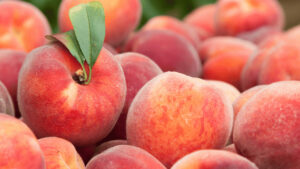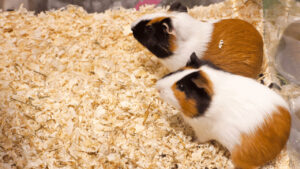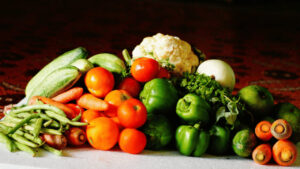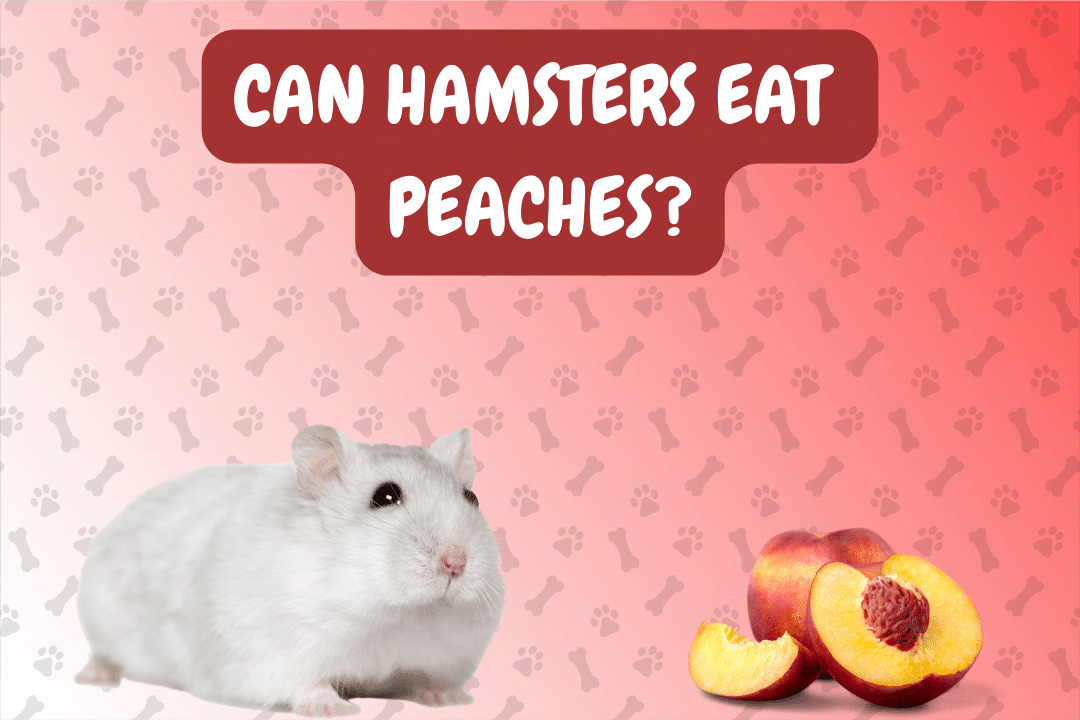No, hamsters can’t eat peaches, because they are too high in sugar and can cause health problems for your furry friend. Peaches are also acidic and can irritate the hamster’s digestive system. While peaches are a delicious and nutritious fruit for humans, they are not suitable for hamsters.
Table of Contents
Introduction
Hamsters are adorable and popular pets that can bring joy and entertainment to their owners. They are also relatively easy to care for, as long as you provide them with a spacious cage, bedding, toys, water, and food. But what kind of food should you feed your hamster? What are the best foods for hamster nutrition and health? And what foods should you avoid giving to your hamster?
In this article, we will answer these questions and more, focusing on one specific food item: peaches. Peaches are a juicy and sweet fruit that many people enjoy, especially in the summer. Can hamsters eat peaches? Are peaches safe for hamsters? And if so, how much and how often can you give peaches to your hamster?
We will explore these topics in detail, providing you with the facts and guidelines you need to know before feeding peaches to your hamster. We will also discuss the nutritional value of peaches, the potential risks of feeding peaches to hamsters. Also how to serve peaches safely to hamsters, and some serving suggestions and alternatives. Finally, we will present some expert opinions and recommendations from veterinarians and hamster experts.

Nutritional Value of Peaches
Peaches are a natural source of essential vitamins and minerals, including vitamin A, vitamin C, potassium, and fiber. These nutrients contribute to a hamster’s overall well-being, supporting their immune system, promoting healthy skin, and aiding in digestion. Peaches also contain antioxidants, which can help protect against disease and inflammation.
However, peaches are also very high in sugar, which can be harmful to hamsters if consumed in excess. Sugar can cause obesity, diabetes, tooth decay, and other serious health issues in hamsters. Peaches are also acidic, which can irritate the hamster’s stomach and mouth, and cause diarrhea, vomiting, or ulcers. Therefore, peaches are not a good food choice for hamsters, and should be avoided or given very sparingly.
Potential Risks of Feeding Peaches to Hamsters
As mentioned above, feeding peaches to hamsters can pose several risks to their health and well-being. Some of the possible consequences of giving peaches to hamsters are:
- Obesity: Hamsters are prone to gaining weight easily, especially dwarf hamsters, which have a higher risk of developing diabetes. Peaches are high in calories and sugar, which can contribute to weight gain and fat accumulation in hamsters. Obesity can lead to various health problems in hamsters, such as heart disease, liver disease, joint problems, and reduced lifespan.
- Diabetes: Diabetes is a condition where the body cannot regulate blood sugar levels properly. That can resulting in high or low blood sugar. Hamsters can develop diabetes if they consume too much sugar or carbohydrates, which can be found in peaches. Diabetes can cause symptoms such as increased thirst, urination, appetite, weight loss, lethargy, cataracts, and infections. Diabetes can also be fatal if left untreated or poorly managed.
- Tooth decay: Hamsters have teeth that grow continuously throughout their lives. So they need to chew on hard and fibrous foods to keep them trimmed and healthy. Peaches are soft and sugary, which can stick to the hamster’s teeth and cause plaque and tartar buildup. This can lead to tooth decay, cavities, infections, and tooth loss. Tooth problems can also affect the hamster’s ability to eat and drink, and cause pain and discomfort.
- Digestive upset: Hamsters have a sensitive digestive system that can be easily disrupted by new or unfamiliar foods. Peaches are acidic and can cause irritation and inflammation in the hamster’s stomach and intestines. This can result in digestive issues such as diarrhea, vomiting, bloating, gas, or ulcers. Digestive upset can also cause dehydration, electrolyte imbalance, and malnutrition in hamsters.
- Allergic reaction: Hamsters can be allergic to certain foods, and peaches may be one of them. Allergic reactions can vary in severity and symptoms. Some common signs are itching, swelling, hives, sneezing, coughing, wheezing, or difficulty breathing. Allergic reactions can also be life-threatening if they cause anaphylaxis. That is a severe and sudden reaction that affects the whole body. If you notice any signs of an allergic reaction in your hamster after feeding them peaches, seek veterinary attention immediately.

How to Serve Peaches Safely to Hamsters
If you decide to give peaches to your hamster, despite the risks and drawbacks, you should follow some guidelines to ensure their safety and minimize the potential harm. Here are some tips on how to serve peaches safely to hamsters:
- Choose fresh and ripe peaches: Fresh peaches are preferable to canned, frozen, or dried peaches, as they have less sugar and preservatives. Ripe peaches are also softer and easier to digest than unripe ones. Avoid peaches that are moldy, bruised, or spoiled, as they can cause infections or poisoning in hamsters.
- Wash and peel the peaches: Before giving peaches to your hamster, wash them thoroughly under running water to remove any dirt, pesticides, or bacteria. Peel off the skin, as it can be tough and hard to digest for hamsters. The skin can also contain traces of chemicals or parasites that can harm your hamster.
- Remove the pit and seeds: The pit and seeds of peaches are not edible and can be very dangerous for hamsters. They can cause choking, intestinal blockage, or perforation, which can be fatal. They can also contain cyanide, which is a toxic substance that can cause poisoning in hamsters. Therefore, always remove the pit and seeds of peaches before giving them to your hamster.
- Cut into small pieces: Hamsters have small mouths and throats, and can choke on large pieces of food. Cut the peaches into small and bite-sized pieces that your hamster can easily hold and chew. This will also help prevent overeating and wastage.
- Feed in moderation: Peaches are high in sugar and should only be given to hamsters as an occasional treat, not as a regular part of their diet. The recommended amount of peaches for hamsters is no more than a teaspoon per week, and less for dwarf hamsters. Feeding too much or too often can cause health problems in hamsters, as discussed above.
- Monitor your hamster: After feeding peaches to your hamster, keep an eye on them for any signs of discomfort, allergic reaction, or illness. If you notice any abnormal behavior or symptoms, stop feeding peaches and consult your veterinarian. Also, check your hamster’s cage for any leftover or hidden pieces of peaches, and remove them promptly to prevent spoilage and mold growth.

Serving Alternatives
If you want to give your hamster a tasty and healthy treat, there are many alternatives to peaches that are safer and more suitable for their nutrition and diet. Some of the serving suggestions for peaches are:
- Other fruits: There are many fruits that are safe and beneficial for hamsters, such as apples, pears, strawberries, blueberries, blackberries, raspberries, melons, and kiwis. These fruits are low in sugar and high in vitamins, antioxidants, and fiber. However, they should still be given in moderation and prepared properly, as explained above. Avoid citrus fruits, such as oranges, lemons, or grapefruits, as they are too acidic and can cause digestive upset in hamsters.
- Vegetables: Vegetables are a great source of nutrients and hydration for hamsters, and can be given more frequently than fruits. Some of the vegetables that are good for hamsters are carrots, broccoli, cauliflower, cabbage, spinach, kale, cucumber, zucchini, sweet potato, and pumpkin. These vegetables are rich in vitamin A, vitamin C, potassium, calcium, and iron. They also provide fiber and water, which can help with digestion and prevent constipation. However, avoid vegetables that are high in oxalates, such as spinach, beetroot, or rhubarb, as they can cause kidney stones in hamsters. Also, avoid onion, garlic, leek, chives, or scallions, as they can cause anemia in hamsters.
- Herbs: Herbs are another option for hamster treats, as they have various health benefits and flavors. Some of the herbs that are safe and beneficial for hamsters are basil, parsley, cilantro, mint, dill, and sage. These herbs can help with digestion, immunity, inflammation, and stress. They can also add variety and interest to your hamster’s diet. However, avoid herbs that are toxic or harmful to hamsters, such as rosemary, thyme, oregano, lavender, or chamomile.
- Nuts and seeds: Nuts and seeds are a natural and nutritious part of a hamster’s diet, as they provide protein, healthy fats, and minerals. Some of the nuts and seeds that are good for hamsters are almonds, walnuts, peanuts, sunflower seeds, pumpkin seeds, and sesame seeds. These nuts and seeds can help with growth, development, and energy. They can also help keep the hamster’s teeth healthy and strong. However, avoid nuts and seeds that are salted, roasted, or coated, as they can cause dehydration, kidney problems, or obesity in hamsters. Also, avoid nuts and seeds that are poisonous or indigestible for hamsters, such as macadamia nuts, pistachios, cashews, or avocado seeds.
Special Considerations
Before feeding any of the above foods to your hamster, you should take into account some special factors that may affect your hamster’s health and well-being. These include:
- Species: Different species of hamsters have different dietary preferences and requirements. For example, Syrian hamsters are more omnivorous and can eat more animal products, such as meat, cheese, or eggs, while dwarf hamsters are more herbivorous and can eat more plant products, such as fruits, vegetables, or herbs. You should research the specific needs of your hamster’s species and adjust the diet accordingly.
- Age: Younger hamsters need more protein and calcium for growth and development, while older hamsters need more fiber and vitamin A for digestion and vision. You should feed your hamster according to its life stage and change the diet as it matures. Generally, juvenile hamsters need more frequent and larger meals than adult hamsters, and they may also need more supplements to prevent deficiencies.
- Allergies: Some hamsters may be allergic or intolerant to certain foods, and peaches may be one of them. If your hamster shows any signs of an allergic reaction, such as itching, swelling, hives, or difficulty breathing, you should stop feeding the food and seek veterinary attention. You should also avoid feeding any foods that your hamster has shown a negative reaction to in the past.
- Dietary restrictions: Some hamsters may have medical conditions or special needs that require a restricted or modified diet. For example, hamsters with diabetes may need a low-sugar diet, while hamsters with kidney problems may need a low-protein diet. You should consult your veterinarian before feeding any foods to your hamster if it has any health issues or concerns.
Expert Opinion
Many veterinarians and experts agree that peaches are not a suitable food for hamsters, as they can cause more harm than good. Here are some of the opinions and recommendations from the experts:
- Dr. Lianne McLeod, a veterinarian and writer for The Spruce Pets, says that peaches are not a good food for hamsters, as they are high in sugar and can cause obesity, diabetes, and dental problems. She advises that hamsters should be fed a balanced diet that includes a high-quality hamster mix, fresh water, and occasional treats such as fresh vegetables, fruits, nuts, seeds, or cooked eggs. She also warns that hamsters can be picky eaters and may prefer certain foods over others, which can lead to nutritional imbalances. 12
- Dr. Nick Saint-Erne, a veterinarian and writer for PetMD, says that peaches are not a natural part of a hamster’s diet, and they can cause digestive upset and diarrhea. He recommends that hamsters should be fed a diet that mimics their natural habitat, which may include seeds, grains, grasses, insects, and worms. He also suggests that hamsters should be given fresh fruits and vegetables only once or twice a week, and in small amounts. He also advises that hamsters should be given calcium and vitamin supplements to prevent deficiencies and diseases. 13
- Dr. David Crossley, a veterinarian and dental specialist at the Royal Veterinary College, says that peaches are not a good food for hamsters, as they are too sugary and acidic, and can damage the hamster’s teeth and bones. He explains that hamsters have teeth that grow continuously and need to be worn down by chewing on hard and fibrous foods. He recommends that hamsters should be fed a diet that consists of 80% to 90% hay, and 10% to 20% pellets, seeds, or fresh foods. He also advises that hamsters should be given dental check-ups regularly to prevent tooth problems.
Conclusion
Hamsters are omnivorous animals that can eat a variety of foods, but hamsters can’t eat peaches. Peaches are high in sugar and acid, which can be harmful to hamsters’ health. They can cause obesity, diabetes, tooth decay, digestive upset, and allergic reactions in hamsters. Therefore, it is best to avoid feeding peaches to hamsters altogether, and opt for other foods that are safer and more suitable for their nutrition and diet.
FAQ
Here are some of the frequently asked questions and answers related to hamsters and peaches:
Can hamsters eat peach yogurt?
No, hamsters can’t eat peach yogurt, as it is a dairy product that contains lactose, which hamsters can’t digest. Peach yogurt can also contain sugar, acid, and artificial flavors, which can be bad for hamsters’ health. Peach yogurt can cause lactose intolerance, obesity, diabetes, dental problems, digestive issues, and allergic reactions in hamsters.
Can hamsters eat peaches skin?
No, hamsters can’t eat peach skin, as it can be tough and hard to digest for hamsters. The skin can also contain traces of chemicals or parasites that can harm your hamster. Therefore, always peel off the skin of peaches before giving them to your hamster.
Can hamsters eat peach pits?
No, hamsters can’t eat peach pits, as they are not edible and can be very dangerous for hamsters. They can cause choking, intestinal blockage, or perforation, which can be fatal. They can also contain cyanide, which is a toxic substance that can cause poisoning in hamsters. Therefore, always remove the pit of peaches before giving them to your hamster.
Can hamsters eat dried peaches?
No, hamsters can’t eat dried peaches, as they are even worse than fresh peaches, as they have higher concentrations of sugar, acid, and cyanide, and they lack water and fiber, which are essential for hamsters’ hydration and digestion. Dried peaches can cause severe dehydration, diarrhea, and cyanide poisoning in hamsters.
Can hamsters eat canned peaches?
No, hamsters can’t eat canned peaches, as they are processed peaches that have been soaked in sugar syrup, preservatives, and additives. Canned peaches are extremely high in sugar and artificial ingredients, which can be harmful to hamsters’ health. Canned peaches can cause diabetes, dental problems, digestive issues, and allergic reactions in hamsters.
Hello! I’m Max Walley, a pet enthusiast who knows a lot about what our animal buddies can munch on and what’s a no-no. With ‘canpeteat.it,’ I’m here to help pet owners make smart food choices. Come with me as we dive into the world of pet nutrition, discovering what keeps our furry pals joyful and in tip-top shape. Let’s explore this adventure together!


